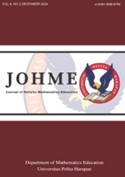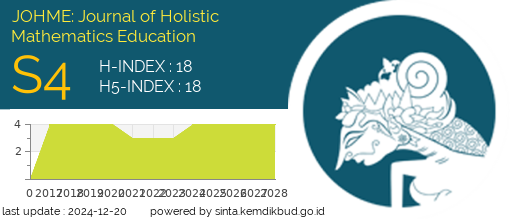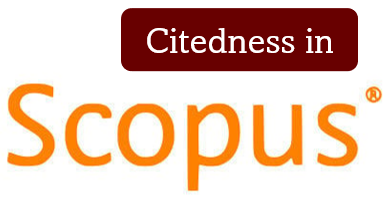PROBLEMATIKA PENALARAN CHATGPT DALAM MENYELESAIKAN SOAL KOMBINATORIKA [THE PROBLEMATIC REASONING OF CHATGPT IN SOLVING COMBINATORICS PROBLEMS]
DOI:
https://doi.org/10.19166/johme.v8i2.8600Keywords:
artificial intelligence, ChatGPT, combinatorics, reasoning, kecerdasan buatan, kombinatorika, penalaranAbstract
The development of the digital era in the 21st century has brought significant changes in various aspects of human life, especially education. Technologies such as artificial intelligence (AI) have been applied in various fields, including education, to improve the efficiency and effectiveness of learning. ChatGPT, one of the text-based AI models, is used to answer various user questions. This study aims to analyze ChatGPT's problematic reasoning in solving combinatorics problems. The research method used is qualitative with a case study design. Data were collected through a test and interview (questions and answers) to ChatGPT version 3.5. The results showed that ChatGPT's problems were errors in calculating the number and position of letters, as well as inconsistency in the answers given. Although ChatGPT can provide explanations of basic concepts in combinatorics, ChatGPT has limitations in in-depth reasoning and lacks precise calculation accuracy. In fact, ChatGPT was unable to answer the questions clearly. This shows that ChatGPT lacks reasoning towards solving combinatorics problems. Users need to evaluate and verify the responses/answers given by ChatGPT.
BAHASA INDONESIA ABSTRACT: Perkembangan era digital pada abad ke-21 telah membawa perubahan signifikan dalam berbagai aspek kehidupan manusia, khususnya bidang pendidikan. Teknologi seperti kecerdasan buatan/artificial intelligence (AI) telah diterapkan dalam berbagai bidang, termasuk pendidikan, untuk meningkatkan efisiensi dan efektivitas pembelajaran. ChatGPT, sebagai salah satu model AI berbasis teks, digunakan untuk menjawab berbagai pertanyaan pengguna. Penelitian ini bertujuan untuk menganalisis problematika penalaran ChatGPT dalam menyelesaikan soal-soal kombinatorika. Metode penelitian yang digunakan adalah kualitatif dengan desain studi kasus. Data dikumpulkan melalui tes dan wawancara (tanya jawab) terhadap ChatGPT versi 3.5. Hasil penelitian menunjukkan bahwa problematika ChatGPT adalah kesalahan dalam perhitungan jumlah dan posisi huruf, serta ketidakonsistenan dalam jawaban yang diberikan. Meskipun, ChatGPT mampu memberikan penjelasan konsep dasar dalam kombinatorika, tetapi ChatGPT memiliki keterbatasan dalam penalaran mendalam dan tidak memiliki akurasi perhitungan yang tepat. Bahkan ChatGPT tidak dapat menjawab soal yang diberikan secara jelas. Hal ini menunjukkan bahwa ChatGPT memiliki penalaran yang kurang terhadap penyelesaian soal kombinatorika. Pengguna perlu untuk melakukan evaluasi dan verifikasi respons/jawaban yang diberikan oleh ChatGPT.
References
Abdilah, Y. A. (2023). Tinjauan sistematis etika penggunaan ChatGPT di perguruan tinggi. Integralistik, 34(2), 69-78. https://doi.org/10.15294/integralistik.v34i2.50278
An, J., Lee, J., & Gweon, G. (2023). Does ChatGPT comprehend place value in numbers when solving math word problems? CEUR Workshop Proceedings, 3491, 49-58. Retrieved from https://ceur-ws.org/Vol-3491/paper5.pdf
Anas, I., & Zakir, S. (2024). Artificial intelligence: Solusi pembelajaran era digital 5.0. Jurnal Sains Komputer & Informatika, 8(1), 35-46. Retrieved from https://tunasbangsa.ac.id/ejurnal/index.php/jsakti/article/view/764/739
Andryan, E., & Wijayanti, D. E. (2022). Implementasi teori bilangan dalam permainan kartu uno. Pedagogy: Jurnal Pendidikan Matematika, 9(1), 29-42. https://doi.org/10.30605/pedagogy.v9i1.3377
Anis, M. Z. A., Mardiani, F., & Fathurrahman, F. (2022). Digital history dan kesiapan belajar sejarah di era revolusi 4.0. Fajar Historia: Jurnal Ilmu Sejarah dan Pendidikan, 6(1), 29-42. https://doi.org/10.29408/fhs.v6i1.4375
Ausat, A. M. A., Suherlan, & Azzaakiyyah, H. K. (2023). Is ChatGPT dangerous for lecturer profession? An In-depth Analysis. Jurnal Pendidikan dan Konseling, 5(2), 3226-3229. Retrieved from https://journal.universitaspahlawan.ac.id/index.php/jpdk/article/view/13878/10575
Bhagyamma, G., & Ramesh. (2023). Formulating research problems: Building the foundation for reflective scientific inquiry. International Journal of Law Management & Humanities, 1(6), 1-14. Retrieved from https://papers.ssrn.com/sol3/papers.cfm?abstract_id=4649234
Bishop, J. M. (2021). Artificial intelligence is stupid and causal reasoning will not fix it. Frontiers in Psychology, 11, 1-18. https://doi.org/10.3389/fpsyg.2020.513474
Biswas, S. (2023). Role of ChatGPT in computer programming. Mesopotamian Journal of Computer Science, 8-16. https://doi.org/10.58496/mjcsc/2023/002
Božić, V., & Poola, I. (2023). ChatGPT and education. Education, 1(1), 1-9. Retrieved from https://www.researchgate.net/publication/369926506_Chat_GPT_and_education
Buhr, C. R., Smith, H., Huppertz, T., Bahr-Hamm, K., Matthias, C., Blaikie, A., Kelsey, T., Kuhn, S., & Eckrich, J. (2023). ChatGPT versus consultants: Blinded evaluation on answering otorhinolaryngology case-based questions. JMIR Medical Education, 9(1), 1-9. https://doi.org/10.2196/49183
Chen, L., Chen, P., & Lin, Z. (2020). Artificial intelligence in education: A review. IEEE Access, 8(1), 75264-75278. https://doi.org/10.1109/ACCESS.2020.2988510
Creswell, J. W. (2013). Qualitative inquiry and research design: Choosing among five approaches. London, UK: Sage Publications.
Deng, J., & Lin, Y. (2023). The benefits and challenges of ChatGPT: An overview. Frontiers in Computing and Intelligent Systems, 2(2), 81-83. https://doi.org/10.54097/fcis.v2i2.4465
Faiz, A., & Kurniawaty, I. (2023). Tantangan penggunaan ChatGPT dalam pendidikan ditinjau dari sudut pandang moral. Edukatif: Jurnal Ilmu Pendidikan, 5(1), 456-463. https://doi.org/10.31004/edukatif.v5i1.4779
Frieder, S., Pinchetti, L., Chevalier, A., Griffiths, R. R., Salvatori, T., Lukasiewicz, T., Petersen, P., & Berner, J. (2023). Mathematical capabilities of ChatGPT. Advances in Neural Information Processing Systems, 36, 1-46. https://doi.org/10.48550/arXiv.2301.13867
Hu, D., Wei, L., & Huai, X. (2021). DialogueCRN: Contextual reasoning networks for emotion recognition in conversations. ACL-IJCNLP 2021 - 59th Annual Meeting of the Association for Computational Linguistics and the 11th International Joint Conference on Natural Language Processing, Proceedings of the Conference, 7042-7052. https://doi.org/10.18653/v1/2021.acl-long.547
Huang, J., & Chen-Chuan Chang, K. (2023). Towards reasoning in large language models: A survey. Proceedings of the Annual Meeting of the Association for Computational Linguistics, 1049-1065. https://doi.org/10.18653/v1/2023.findings-acl.67
Iqbal, M., Zarlis, M., Tulus, & Mawengkang, H. (2020). Model pendekatan metaheuristik dalam penyelesaian optimisasi kombinatorial. Seminar Nasional Teknologi Komputer & Sains (SAINTEKS), 1, 92-97. Retrieved from https://prosiding.seminar-id.com/index.php/sainteks/article/view/411
Iriyani, S. A., Patty, E. N. S., Akbar, A. R., Idris, R., & Priyudahari, B. A. P. (2023). Studi literatur: Pemanfaatan teknologi ChatGPT dalam pendidikan. UPGRADE: Jurnal Pendidikan Teknologi Informasi, 1(1), 9-15. https://doi.org/10.30812/upgrade.v1i1.3151
Ivanova, T., Staneva, A., Borissova, D., & Rasheva-Yordanova, K. (2024). ChatGPT performance evaluation model for learning. Lecture Notes in Networks and Systems, 1(1), 149-157. https://doi.org/10.1007/978-3-031-54327-2_15
Kohnke, L., Moorhouse, B. L., & Zou, D. (2023). ChatGPT for language teaching and learning. RELC Journal, 54(2), 537-550. https://doi.org/10.1177/00336882231162868
Liu, X., Zheng, Y., Du, Z., Ding, M., Qian, Y., Yang, Z., & Tang, J. (2023). GPT understands, too. AI Open, 5, 208-215. https://doi.org/10.1016/j.aiopen.2023.08.012
McLeish, S., Schwarzschild, A., & Goldstein, T. (2024). Benchmarking ChatGPT on algorithmic reasoning. Maryland, 1(1), 1-12. Retrieved from http://arxiv.org/abs/2404.03441
Merentek, T. C., Usoh, E. J., & Lengkong, J. S. J. (2023). Implementasi kecerdasan buatan ChatGPT dalam pembelajaran. Jurnal Pendidikan Tambusai, 7(3), 26862-26869. Retrieved from https://jptam.org/index.php/jptam/article/view/10960/8703
Miles, M. B., Huberman, A. M., & Saldaña, J. (2014). Qualitative data analysis: A method sourcebook. London, UK: Sage Publication.
Mustafa. (2023). Aktivitas siswa dalam memecahkan masalah matematika dengan berpikir komputasi berbantuan ChatGPT. Mathema: Jurnal Pendidikan Matematika, 5(2), 283-298. https://doi.org/10.33365/jm.v5i2.3469
Oaksford, M., & Chater, N. (2020). New paradigms in the psychology of reasoning. Annual Review of Psychology, 71, 305-330. https://doi.org/10.1146/annurev-psych-010419-051132
Pebrian, Y., & Farhat, M. F. (2023). Pemanfaatan artificial intelligence dalam bidang pendidikan. Abdi Jurnal Publikasi, 2(2), 84-87. https://doi.org/10.47668/edusaintek.v11i1.999
Rafidah, A. S., & Maharani, H. N. (2024). Inovasi dan pengembangan produk keuangan syariah: Tantangan dan prospek era revolusi industri 4.0. Edunomika, 8(1), 1-14. Retrieved from https://jurnal.stie-aas.ac.id/index.php/jie/article/view/11649/pdf
Rahmawan, A. Z., & Effendi, Z. (2021). Implementasi society 5.0 dalam kebijakan dan strategi pendidikan pada pandemi covid-19. STRATEGY: Jurnal Inovasi Strategi dan Model Pembelajaran, 2(1), 34-43. https://doi.org/10.51878/strategi.v2i1.861
Rismen, S., Mardiyah, A., & Puspita, E. M. (2020). Analisis kemampuan penalaran dan komunikasi matematis siswa. Mosharafa: Jurnal Pendidikan Matematika, 9(2), 263-274. https://doi.org/10.31980/mosharafa.v9i2.609
Rofiki, I. (2015). Penalaran kreatif versus penalaran imitatif. Prosiding Seminar Nasional Matematika, 1, 57-62. Retrieved from https://www.academia.edu/23406091/Penalaran_Kreatif_versus_Penalaran_Imitatif
Rofiki, I., Nusantara, T., Subanji, & Chandra, T. D. (2017a). Exploring local plausible reasoning: The case of inequality tasks. Journal of Physics: Conference Series, 943(1), 1-9. https://doi.org/10.1088/1742-6596/943/1/012002
Rofiki, I., Nusantara, T., Subanji, & Chandra, T. D. (2017b). Reflective plausible reasoning in solving inequality problem. IOSR Journal of Research & Method in Education, 7(1), 101-112. Retrieved from https://www.researchgate.net/publication/317409290_Reflective_Plausible_Reasoning_in_Solving_Inequality_Problem
Setiawan, D., Karuniawati, E. A. D., & Janty, S. I. (2023). Peran ChatGPT (Generative pre-training transformer) dalam implementasi ditinjau dari dataset. INNOVATIVE: Journal of Social Science Research, 3(3), 9527-9539. Retrieved from https://j-innovative.org/index.php/Innovative/article/view/3286/2325
Sholihatin, E., Diani, A., Saka, P., Rizky Andhika, D., Pranawa, A., Ardana, S., Yusaga, C. I., Fajar, R. I., & Virgano, B. A. (2023). Pemanfaatan teknologi ChatGPT dalam pembelajaran bahasa Indonesia di era digital pada mahasiswa Universitas Pembangunan Nasional Veteran Jawa Timur. Jurnal Tuah Pendidikan dan Pengajaran Bahasa, 5(1), 1-10. Retrieved from https://jtuah.ejournal.unri.ac.id/index.php/JTUAH/article/view/8032/6678
Singh, S. K., Kumar, S., & Mehra, P. S. (2023). ChatGPT & Google Bard AI: A review. 2023 International Conference on IoT, Communication and Automation Technology (ICICAT), 1-6. https://doi.org/10.1109/icicat57735.2023.10263706
Suharmawan, W. (2023). Pemanfaatan ChatGPT dalam dunia pendidikan. Education Journal: Journal Educational Research and Development, 7(2), 158-166. https://doi.org/10.31537/ej.v7i2.1248
Supriyadi, E. (2022). Eksplorasi penggunaan ChatGPT dalam penulisan artikel pendidikan matematika. Papanda Journal of Mathematics and Science Research, 1(2), 54-68. https://doi.org/10.56916/pjmsr.v1i2.255
Takahashi, A. R. W., & Araujo, L. (2020). Case study research: Opening up research opportunities. RAUSP Management Journal, 55(1), 100-111. https://doi.org/10.1108/RAUSP-05-2019-0109
Usodo, B., Aulia, I. I., Wulandari, A. N., Sutopo, Setiawan, R., Kurniawati, I., & Kuswardi, Y. (2020). Fragmentation of thinking structure and its impact to students’ algebraic concept construction and problem solving. Journal of Physics: Conference Series, 1567(3), 1-7. https://doi.org/10.1088/1742-6596/1567/3/032006
Utomo, H. P., Hendrayana, A., Yuhana, Y., & Saputro, T. V. D. (2021). Pengaruh gender terhadap kemampuan pemecahan masalah dan penalaran matematis ditinjau dari minat belajar. Tirtamath: Jurnal Penelitian dan Pengajaran Matematika, 3(2), 106-115. https://doi.org/10.48181/tirtamath.v3i2.12643
Warsitasari, W. D., & Rofiki, I. (2023). Utilizing GeoGebra for solving economic mathematics problems: Promoting logical reasoning in problem-based learning. AKSIOMA: Jurnal Program Studi Pendidikan Matematika, 12(3), 3445-3456. https://doi.org/10.24127/ajpm.v12i3.7300
Warsitasari, W. D., & Rofiki, I. (2024). Students’ logical reasoning skills in economic mathematics problem solving through problem-based learning aided by GeoGebra. The 4th International Conference on Mathematics and its Applications (ICOMATHAPP) 2023: Mathematics and its Applications on Society 5.0: Challenges and Opportunities, 3235(1), 1-10. https://doi.org/10.1063/5.0234503
Yang, L., Jiang, F., & Li, H. (2024). Is ChatGPT involved in texts? Measure the Polish ratio to detect ChatGPT-generated text. APSIPA Transactions on Signal and Information Processing, 13(2), 1-19. https://doi.org/10.1561/116.00000250
Yaqub, M. Z., & Alsabban, A. (2023). Industry-4.0-enabled digital transformation: Prospects, instruments, challenges, and implications for business strategies. Sustainability, 15(11), 1-33. https://doi.org/10.3390/su15118553
Yulianti, G., Benardi, Permana, N., & Wijayanti, F. A. K. (2023). Transformasi pendidikan Indonesia: Menerapkan potensi kecerdasan buatan (AI). JISMA: Journal of Information Systems and Management, 2(6), 102-106. Retrieved from https://jisma.org/index.php/jisma/article/view/1076/190
Zein, A. (2023). Dampak penggunaan ChatGPT pada dunia pendidikan. JITU: Jurnal Informatika Utama, 1(2), 19-24. Retrieved from https://jurnal.astinamandiri.com/index.php/jitu/article/view/151/108Downloads
Published
How to Cite
Issue
Section
License
Copyright (c) 2025 Imam Rofiki, Aulia Rahma Dewi

This work is licensed under a Creative Commons Attribution-ShareAlike 4.0 International License.
Authors who publish with this journal agree to the following terms:
1) Authors retain copyright and grant the journal right of first publication with the work simultaneously licensed under a Creative Commons Attribution License (CC-BY-SA 4.0) that allows others to share the work with an acknowledgement of the work's authorship and initial publication in this journal.
2) Authors are able to enter into separate, additional contractual arrangements for the non-exclusive distribution of the journal's published version of the work (e.g., post it to an institutional repository or publish it in a book), with an acknowledgement of its initial publication in this journal.
3) Authors are permitted and encouraged to post their work online (e.g., in institutional repositories or on their website). The final published PDF should be used and bibliographic details that credit the publication in this journal should be included.”










